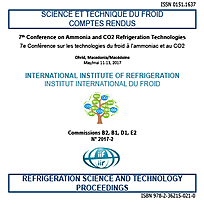
IIR document
Emeritus: the new condenser/CO2 gas cooler/dry cooler that minimizes energy consumption.
Number: pap. n. 0020
Author(s) : FILIPPINI S., MARIANI G., PERROTTA L., et al.
Summary
In refrigeration and power cycles processes the use of air as heatsink for condensing, when large quantities of water are not available, is a common practice and even more frequent. Although ambient air has the great advantage of being available everywhere and in unlimited quantity, it also has numerous disadvantages: highly variable temperatures, low exchange coefficients, need to use of large heat exchange surfaces and large air quantities. To limit these drawbacks, LU-VE has developed an innovative solution named EMERITUS. This technology has a fan-cooled exchanger on which two additional water cooling systems are used in sequence: treated water is sprayed onto the heat exchanger coil and the remaining non-evaporated is collected and used on to the adiabatic panel. This combination of the two techniques has positive effects on both the thermal capacity exchanged and the quantity of water consumed. The article describes the functional principle of the new EMERITUS and analyses a case study in which the running costs of a water chiller combined with EMERITUS are compared with other traditional solutions.
Available documents
Format PDF
Available
Public price
20 €
Member price*
Free
* Best rate depending on membership category (see the detailed benefits of individual and corporate memberships).
Details
- Original title: Emeritus: the new condenser/CO2 gas cooler/dry cooler that minimizes energy consumption.
- Record ID : 30021640
- Languages: English
- Subject: Technology
- Source: 7th Conference on Ammonia and CO2 Refrigeration Technology. Proceedings: Ohrid, North Macedonia, May 11-13, 2017.
- Publication date: 2017/05/11
- DOI: http://dx.doi.org/10.18462/iir.nh3-co2.2017.0020
- Document available for consultation in the library of the IIR headquarters only.
Links
See other articles from the proceedings (42)
See the conference proceedings
Indexing
-
New heat exchangers for high efficiency CO2 pla...
- Author(s) : FILIPPINI S., MERLO U.
- Date : 2016/08/21
- Languages : English
- Source: 12th IIR Gustav Lorentzen Conference on Natural Refrigerants (GL2016). Proceedings. Édimbourg, United Kingdom, August 21st-24th 2016.
- Formats : PDF
View record
-
Air cooled heat exchangers for CO2 refrigeratio...
- Author(s) : FILIPPINI S., MERLO U.
- Date : 2011/08/21
- Languages : English
- Source: Proceedings of the 23rd IIR International Congress of Refrigeration: Prague, Czech Republic, August 21-26, 2011. Overarching theme: Refrigeration for Sustainable Development.
- Formats : PDF
View record
-
DRY and SPRAY technology: high efficient heat e...
- Author(s) : FILIPPINI S.
- Date : 2011/04/14
- Languages : English
- Source: 4th Conference on Ammonia Refrigeration Technology. Proceedings: Ohrid, North Macedonia, April 14-16, 2011.
- Formats : PDF
View record
-
Design and integration of CO2 gas cooler/conden...
- Author(s) : GE Y. T., TASSOU S. A., DEWA SANTOSA I., et al.
- Date : 2014/06/23
- Languages : English
- Source: 3rd IIR International Conference on Sustainability and the Cold Chain. Proceedings: London, UK, June 23-25, 2014
- Formats : PDF
View record
-
Effect of geometry on the performance of CO2 ga...
- Author(s) : GE Y., TASSOU S., TSAMOS K., et al.
- Date : 2015/08/16
- Languages : English
- Source: Proceedings of the 24th IIR International Congress of Refrigeration: Yokohama, Japan, August 16-22, 2015.
- Formats : PDF
View record
